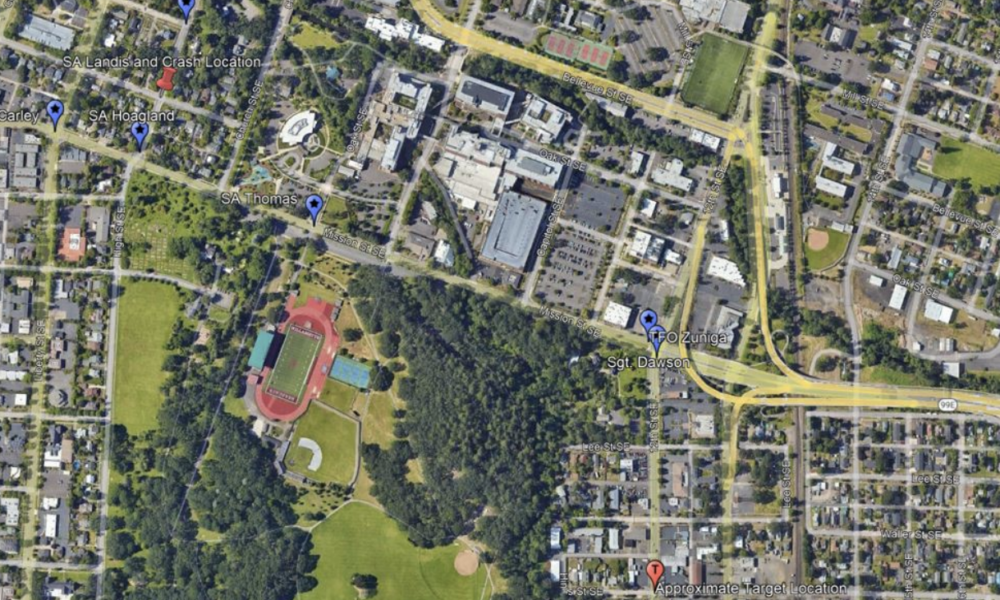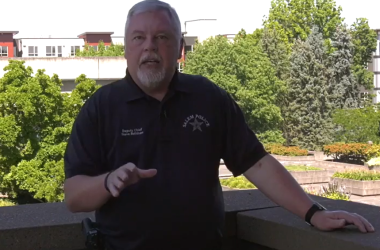A DEA agent has not proved that his defense for running a stop sign and killing a Salem cyclist entitles him to move to federal court and possibly get the charges dismissed, state attorneys argued on Tuesday.
“There was no urgency, there was no emergency” when Samuel T. Landis drove through a stop sign into the path of a Salem cyclist who was killed by the impact, a state Justice Department attorney argued before a panel of judges in the Ninth U.S. Circuit Court of Appeals in Seattle.
His attorney argued that Landis made a “mistake of judgment,” but he made a “reasonable decision” to go through the intersection without stopping last year.
The legal back-and-forth came in a hearing carried live online on Tuesday, May 7. The panel has no schedule for deciding whether the case should be sent back to Marion County Circuit Court or if Landis can press ahead defending himself at the federal level.
The difference comes down to immunity. In federal court, Landis can argue he shouldn’t be charged because he was performing as a federal officer. In state court, he would have to face the charge of criminally negligent homicide.
A federal judge in December agreed to move the criminal case involving Landis to federal court after concluding that surveillance is a key duty of his work for the U.S. government and could justify the agent breaking state traffic laws. The move allowed Landis, 38, to then argue he is immune from prosecution because he was part of a team tracking a major drug dealer when the collision occurred.
The Oregon Department of Justice in January appealed that decision, arguing that Landis should be tried in state court, where he was originally charged for his role in the collision that killed cyclist Marganne Allen.
That dispute set up the oral argument Tuesday.
To move the case to federal court, Landis needed to prove that his decision to run the stop sign was necessary to carry out his duties as a federal officer, according to Philip Thoennes, senior assistant attorney general.
Thoennes said there was no evidence of any urgency or emergency that required the agent to violate traffic laws.
Judges M. Margaret McKeown and John B. Owens said during the hearing that the agent only had to prove that his federal defense was valid, not that it would win, to justify his case being moved to federal court. McKeown asked the state attorney to address that, as well as testimony from other agents that Landis was trying to catch up with the rest of his team during the surveillance mission.
Thoennes said the burden was on the Landis to prove his defense was valid, and he didn’t do so. The agent “must do more than simply say, ‘I intend to prove at a later time that my conduct was necessary and proper,’” he said.
He said Landis and the others on the surveillance detail “uniformly testified that there was no urgency, there was no emergency” that warranted violating state traffic law.
“If there’s not an urgency, there still could be a necessity given the other officers’ testimony,” McKeowen asked. “So, how do you square those two?”
Thoennes said judges in earlier cases have determined that a situation must be urgent for federal officers to be justified in violating state traffic law. Members of the surveillance team testified that they were trying to stay on the suspect’s tail, one agent had eyes on the suspect and they were all communicating by radio, but “there was no hot pursuit,” he said.
Amy Potter, an attorney representing Landis, told the judges that the agent had presented a valid immunity defense.
While lights and sirens weren’t needed, “there was a certain level of urgency,” she said.
“This is surveillance – surveillance of a fentanyl dealer in the community who was driving erratically, and there was a necessity to keep up with the team,” she said. “Special Agent Landis made a decision. It was a mistake of judgment, we know that. It was a tragedy that happened. But he made that reasonable decision in the context of law enforcement surveillance. That is markedly different than just driving a convoy or driving a postal truck.”
Potter said there is no evidence that the federal judge erred in removing the case from state court.
“The district court had all the evidence, examined it carefully, and it’s not implausible or illogical what the district court did,” she said.
If the state’s appeal is denied and the case stays in federal court, Potter said she intends to seek dismissal of the case.
Then, she said the key question will not be if running the stop sign was necessary, but whether Landis believed it was necessary based on what he knew at the time.
“He was acting as a special agent. He was conducting surveillance and he reasonably believed, and the testimony from all the officers is that it is reasonable to violate traffic laws during surveillance,” she said. “He’s now been charged with a state crime. He’s entitled to have that removed. He’s entitled to file his motion to dismiss. If he’s not successful, he’s entitled to be tried in federal court. That’s what Congress has said.”
RELATED COVERAGE:
DEA agent disputes state’s appeal, insists on seeking immunity in bike crash
State asserts DEA agent has no federal immunity for fatal Salem collision
Judge says DEA agent’s duties could justify dropping charge in fatal cyclist collision
DEA agent admits role in fatal cyclist collision, seeks federal immunity
DEA agent faces state felony charge in death of Salem cyclist
Video shows driver ran stop sign in fatal collision with Salem cyclist
Salem police gave evidence to DEA minutes after agent’s fatal collision with cyclist
Contact reporter Ardeshir Tabrizian: [email protected] or 503-929-3053.
SUPPORT OUR WORK – We depend on subscribers for resources to report on Salem with care and depth, fairness and accuracy. Subscribe today to get our daily newsletters and more. Click I want to subscribe!

Ardeshir Tabrizian has covered criminal justice and housing for Salem Reporter since September 2021. As an Oregon native, his award-winning watchdog journalism has traversed the state. He has done reporting for The Oregonian, Eugene Weekly and Malheur Enterprise.









